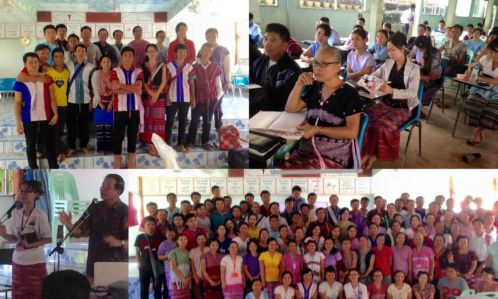Ecumenical Formation Seminar for Theological Educators in Refugee Camps
 Ecumenical Formation Seminar for Theological Educators in Refugee Camps
Ecumenical Formation Seminar for Theological Educators in Refugee Camps
Maesot, Thailand
4-6 November 2015
A three day Seminar on Ecumenical Formation in Theological Education was organised by the Christian Conference of Asia (CCA) at the Kawthoolei Karen Baptist Bible School and College (KKBBSC) in Mae La refugee camp, on the Myanmar- Thailand border, from 4-6 November 2015. About 100 teachers of seven Bible Schools of Karen Baptist Churches dispersed in eight refugee camps alongside the Thai-Myanmar border attended the seminar.
The seminar for theological educators of Bible Schools in refugee camps was part of CCA’s new initiative of ecumenical formation at the grass-roots and ecumenical leadership development from the bottom to top in Asia.
The seminar helped theological educators of the refugee camps based Bible Schools who do not have access normally to ecumenical theological education training.
Mae La refugee camp, 60 kilometres north of Mae Sot on the border between Myanmar and Thailand is the largest in a chain of seven refugee camps inhabited mainly by Karen refugees fleeing the Myanmar Military Government. The border camps host about 500,000 refugees who had to flee Myanmar during the past three decades.
Within the refugee camps the Baptist church remains the largest Christian group by far and each of the seven camps has at least one Baptist Bible School. Although, the highest course offered in each refugee Camp Bible School is a Bachelor of Theology degree, there are very less opportunities for the teachers of the Bible schools to teach ecumenism or orient themselves in the field of ecumenical theology.
The Kawthoolei Karen Baptist Bible School and College (KKBBSC) started in 1983 with four teachers and six students, today accommodates 450 students.
Rev. Dr. Pradit Takerngrangsarit, Rev. Grace Moon, Dr. Panger, and Rev. Grant were the resource persons of various seminar sessions.










